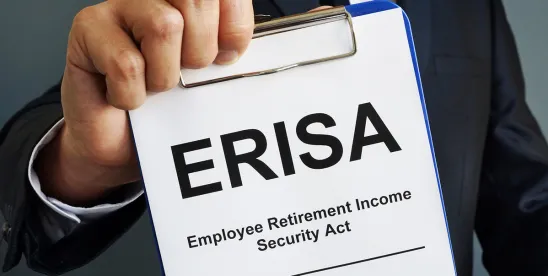Recently, the Second Circuit became the latest circuit refusing to enforce individual arbitration of an ERISA class action, joining the Third, Seventh, and Tenth Circuits. The Ninth Circuit, by contrast, has held that class action ERISA claims brought on behalf of plans are subject to individual arbitration, with relief limited to the individual plaintiff’s claims.
In Cedeno v. Sassson, 100 F.4th 386 (2d Cir. 2024), plan participant Ramon Cedeno sued Argent Trust Company, the trustee of his former employer’s employee stock ownership plan (“ESOP”), alleging that Argent breached its fiduciary duties by causing the ESOP to overpay for company stock. Mr. Cedeno sought relief under ERISA Section 502(a)(2), which allows a plan participant to bring a civil action for appropriate relief under Section 409(a). In turn, Section 409 holds fiduciaries personally liable for any losses to the plan resulting from their breaches.
The Plan document in Cedeno included a mandatory arbitration provision. It stated that participant claims concerning the Plan would be settled by binding arbitration, in an individual capacity (not representative or collective), and that the participant could not seek additional benefits or relief beyond their own claim.
The district court denied the defendants’ motion to compel arbitration, finding the Plan’s arbitration provision unenforceable. It reasoned that Section 502(a)(2) allowed Mr. Cedeno the right to seek plan-wide relief in a representative capacity, but the arbitration provision limited him to individualized relief and waived his statutory rights.
The Second Circuit panel majority (2-1) agreed with the district court. The Circuit Court relied on the “effective vindication doctrine,” which states that provisions in an arbitration agreement that prevent parties from effectively vindicating statutory rights are unenforceable. Because the Second Circuit determined that the Plan’s arbitration clause impermissibly barred plan-wide relief provided under Section 502(a)(2), it held that the Plan ran afoul of the effective vindication doctrine.
Judge Steven J. Menashi wrote the dissent and argued that the Second Circuit should have compelled Mr. Cedeno to individual arbitration. Judge Menashi (1) highlighted that the Federal Arbitration Act directs courts to respect arbitration agreements and parties’ chosen procedures, and (2) called into question the effective vindication doctrine as a principle with uncertain legal status which the Supreme Court has “always declined to apply … whenever litigants have asked it to do so.”
In support, Judge Menashi pointed to the Supreme Court’s 2013 decision in American Express Co. v. Italian Colors Restaurant, 570 U.S. 228 (2013), where the majority opinion declined to apply the effective vindication doctrine and called it a “judge-made exception to the FAA.” Judge Menashi’s dissent has gained traction and echoes concerns raised by other courts. Recently, Sixth Circuit Judge David W. McKeague referenced Judge Menashi’s dissent in Parker v. Tenneco, Inc. Judge McKeague noted that the key question in Parker was “whether this effective vindication exception to the FAA even exists.”
The Second Circuit’s decision deepened the debate over whether, under the effective vindication doctrine, benefit plan language requiring claim arbitration impermissibly deprived ERISA claimants of their statutory rights. While the majority held that such provisions cannot withstand the effective vindication doctrine, the dissent outlined a tentative path to forcing Mr. Cedeno into arbitration while suggesting that the doctrine may not even exist.
Given the conflict between enforcing plan arbitration agreements and safeguarding ERISA’s statutory rights, this issue may soon come before the Supreme Court. Ultimately, as four circuits have now affirmed the unenforceability of plan arbitration provisions which prevent vindication of ERISA’s statutory rights, ERISA plan sponsors and fiduciaries must be deliberate when drafting such plan provisions.





 />i
/>i

